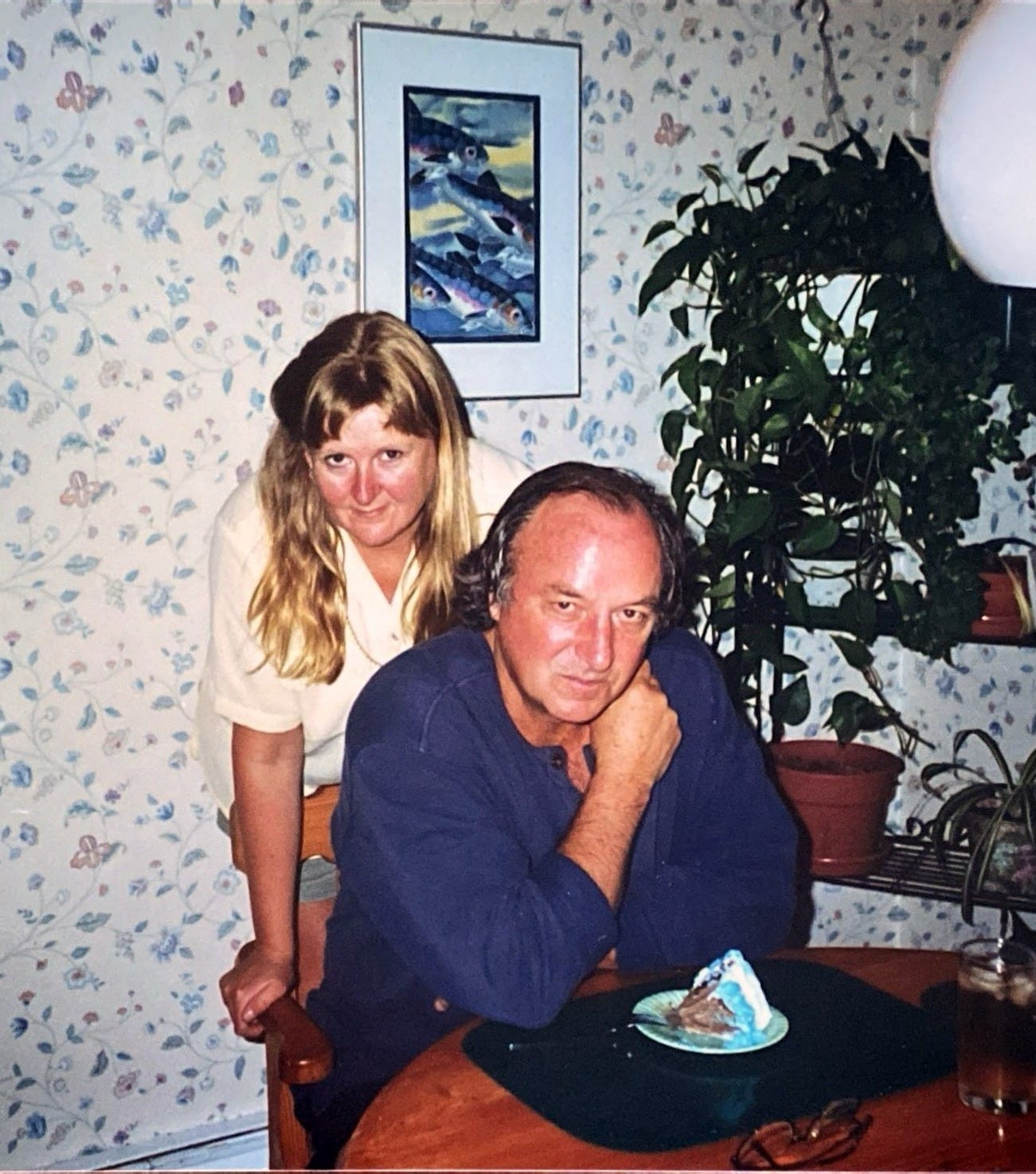Dangerously close
New bio of local journalist hits mark
Dangerously Close to Contempt: The Restless Life of Roger Bill - Journalism’s Unrepentant Agitator is published by After Books Inc and is available in local bookstores.
Alex Bill’s new biography of his father Roger delivers a concise, readable, and tantalizing summary of Roger’s life that will leave both political and media junkies wanting more.
Roger Bill is an American draft dodger, one of the few in Newfoundland and Labrador to be openly identified as such, and through bloody-mindedness, talent, and a lot of hard work, Bill became a force in the local media community.
You may or may not recognize his name, but you know his work both during a 21-year stint at the CBC in radio and from a variety of adventures since, including some time working for CPAC, running The Current, as well as a number of other small but feisty projects online. He found a surprising number of like-minded local collaborators - Greg Locke, Mark Smith, and Craig Westcott, among them - over the last 30 years for his projects. This book touches on a rich political and journalistic history in Newfoundland and Labrador as a key part of the story.
It’s tough to write about your father, full stop. It’s harder still to write about him while he’s still alive and over his objections. Alex pulls this off admirably. He interviewed a lot of people, including Roger and his wife Deanne Fleet but other people tell Roger’s story. They gave Alex sometimes frank, unflattering assessments and it’s clear that some, especially some at CBC with whom Roger had tangled, pulled punches in the interviews. But that just adds to the credibility of the book and really is what makes it work. Sadly, one of the key characters in the episodes, Chris Brookes, died suddenly before Alex could approach him for comments. That relationship alone would have added far more since both were strong characters who shared many of the same qualities and passions.
To be fair, there are a number of aspects of Roger’s life – now that I know about them – that suggest a different approach to this project than the one Alex took. Roger’s earlier life, his two failed marriages, his relationship with his son, Duncan, his relationships with his second and third wives and Roger and Deanne Fleet’s children would be a subject onto themselves, not for any purient fascination but simply to better understand Roger. Roger’s professional life and relationships with people like Chris Brooks or Ron Crocker, as well as Roger’s time in Halifax or especially Toronto with CBC would be another. The result might be a better, more revealing biography and a more revealing examination of news media in Newfoundland and Labrador and Canada of which roger was a part.
But again to be fair, Alex would’ve had great difficulty personally, as well as in the research, in trying to do that. It’s no mark against Alex to say that, just a frank acknowledgement of both the psychological challenge of delving that deeply into a subject so very close to home and at the same time, meeting the practical challenge of running a successful local media outlet *and* raising a family while at the same time producing a decent book in just two years.
Hopefully at some point, Alex will go back to these subjects again and produce a revised version or perhaps an exploration of some specific projects in Roger’s life. Alex could easily step from this book into a history of local media. The transformation of it since Confederation is as much a part of the incredible change in Newfoundland and Labrador that happened, coincidentally, with Roger’s time in the province as anything else. That’s one of the strong themes in this book and we could do with learning more of it. Until that time, which given local currents may never happen, this book will give you a solid foundation for your own understanding and exploration of the local media, politics, and business.
There is much to be said about the relationship between news reporting in Newfoundland and Labrador and power through episodes in which both Roger and Deanne were intimately involved as journalists. The local media types hate when they are the subjects of scrutiny but it’s worthwhile for everyone to understand what makes news and all of things that affect not just the quality of what news outlets report but whether they report things at all. There’s a relationship between how so many priests abused so many children for so long with the active support of so many or the modern Celebritocracy culture of Dannyism and Seamus, Andy, Justin - now shagging some other missus, upalong - and da b’ys. You can start understanding that with this book.
Any reviewer of Alex’s book would be remiss in not also reminding people of Karl Wells’ memoir. If you don’t have it, then get off your arse and get a copy soon. Openly Karl tells it’s own story but since Karl and Roger and Deanne overlap in their careers in the same newsrooms the two books are a natural pairing. You can see this in the reference Alex makes to a comment Karl made about the dominance of Roman Catholics in local Ceeb management. Karl noted in his own memoir that he had more problems with being one of a handful of Protestants at the Catholic Boys’ Club, as the local Ceeb came to be know to some, than he did for being gay.
Roger encountered his own problems with the conservative Roman Catholics and conservative bureaucrats who controlled the local Ceeb newsroom for a very long time. Some of those episodes are covered in the book. Especially noteworthy is the pushback from regional director Ron Crocker, fresh off the catastrophic failure of Prime Time News nationally, who was angered by one of Roger’s local radio projects. Crocker described it to Diane Humber, Roger’s boss, as a “piece of shit.” The program was instantly an audience favourite, though, and won all the internal radio awards CBC had.
By the way, despite Crocker’s poor judgment on Roger’s success, do pick up Ron’s book on Ray Guy. Ray exists more in legend than in fact and Ron’s book has its drawbacks but it does fill a huge gap in local biography of key figures. Again, the cross-over with Roger and with Karl works as well since many of the same characters appear in all three.
During Roger’s career, CBC did produce strong, local content on both radio and television that would be literally impossible today not just due to cost but because the editorial and managerial freedom there was at the Ceeb is gone. Roger may have taken heat but he had the room to get fired up in the first place. The bureaucracy now at Ceeb by accounts that dribble out is stifling and controlled more than ever from upalong.
David Cochrane’s bizarre reappearance for coverage of a provincial election - reprising his boring coverage of 2015’s change of party election - is a perfect example of this centralized bureaucracy. The same goes for the CBC policy that now prevents local news from dealing with federal politicians even on local stories without clearance from the parliamentary bureau, first. Roger Bill got his knuckles rapped when he called China from his Edmonton newsroom at the time of Tiananmen. Now he’d never have been hired in the first place. Had he slipped through, somehow, a modern day Roger would have been sanctioned as surely and as severely as if he had failed to follow one of the Corp’s numerous institutionalized racism policies aimed at combatting institutionalized racism.
No wonder local news is on life support and the local Ceeb headquarters is more than ever just a content assembly facility rather than a newsroom. During Roger’s career at the Mother Corp, CBC’s current affairs radio was well staffed, well funded, and aggressive. Now it is still comparatively well staffed but these days the output is tedious, uninformed as much as it is uninformative, and boring. Radio starts badly every weekday morning with a set of scripted interviews in which the host ignores answers just to get to the next question and gets lost every afternoon with On the gasp. Almost every sentence from 4:00 pm onwards is preceded by a massive and inexplicable gasp of air from the usual host. Once heard, it is impossible to ignore either as annoyance in itself or as a metaphor for the lack of oxygen in the programming across all local CBC platforms.
Roger Bill was and is an oxygen pump.
His kid wrote a great book that tells you about him.
Buy the damn book.






Interesting. A good, though brief outline and summary, is great, for people like me, now way behind on reading book. Almost 3 years since my last book purchase, and that was on Guy Earle, a bit of a stretch as to father worship, by son Phil. Another was good history on the Sealing History, and gave insight in my grandfather's day, he being a swiler, from Upper Island Cove, born in 1847, and who made a little cash in the springtime, by risking life and limb.
I had on my list a book on Richard Squires, but haven't got that yet.
I am about to subscribe to The Atlantic, maybe, and see its been around for 168 years, and at about $150 a year, and 1 million subscribers, is 150 million in revenue. But even they failed to deter enough voters away from Trump.
So, Ray Guy is more legend than factual!. Maybe so, and I admired the legend. That's possible, I guess.
Now Ed, you got 2 pieces on this Bonifire Day, Nov 5th. A good piece on Hogan "Remember," which I thought was in reference to Nov 11th. No substance to this man Hogan, as you show, but almost became Premier. Chalk that up to the Fartman oversight at work. Would you agree?